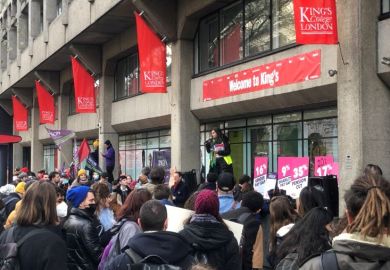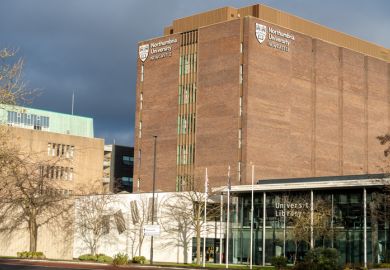Union leaders have repeated their call for a fresh valuation of UK universities’ main pension scheme after new data confirmed its deficit has fallen sharply in the past year, following the recovery of assets to pre-pandemic levels.
As strike action resumed at universities over pay and pensions – with walkouts affecting 68 higher education institutions on 21 and 22 February – a new financial update by the Universities Superannuation Scheme (USS) showed that its deficit fell from £14.1 billion in March 2020, when its latest triennial valuation occurred, to £2.9 billion in January 2022, after its assets grew 22.8 per cent in two years.
That lower deficit means the pension fund is 97 per cent funded, up from 83 per cent in 2020 when markets crashed amid concerns over the long-term impact of Covid.
It has prompted further calls by the University and College Union (UCU) for universities to contribute more towards pensions from April to allow for a “moderately prudent, evidence-based valuation of the financial health of the scheme” to take place in the spring - a move that Universities UK said would cost employers £200 million a year and “does not appear to be a serious attempt to reach agreement”. The next official valuation of the USS is scheduled to take place in March 2023.
Jo Grady, the UCU’s general secretary, said the latest update showed the “weak justification for university bosses’ attack on staff pensions has now completely evaporated”.
The UCU claims that the potential temporary increase would avert reforms to the scheme, starting in April, which it says could cut employees’ guaranteed benefits by as much as 35 per cent and cost members thousands of pounds annually in retirement. UUK’s figures suggest that the reduction is between 10 per cent and 18 per cent.
“Employers have refused to accept UCU’s compromise proposals, which the trustee confirmed are both viable and implementable,” said Dr Grady, who claimed that “this dispute could end tomorrow, but vice-chancellors seem determined to slash the retirement benefits of staff rather than accept small and affordable increases to contributions”.
Claiming that the “higher education sector is in robust financial health”, she added: “If these cuts go through, it will go down as one of the biggest robberies in the history of higher education.”
However, the £2.9 billion deficit was based on structural changes post-April, the USS said. Without these changes, the deficit would be £7.8 billion, down from £18.4 billion.
In a statement, the USS said that the “volatility” of financial markets in recent months meant the “implied deficit has tracked as high as £6.8 billion and as low as £2.6 billion” and without the planned reforms “would be higher”, adding that “it is very difficult to reach any definitive conclusions as to the true direction of travel based on the last few months alone”.
Last week staff at 44 institutions walked out for five days over reforms of the USS. This week a further 24 institutions will join the industrial action with branches having voted to walk out over a pay offer of a 1.5 per cent minimum rise for 2021-22. Unions are demanding a £2,500 uplift instead, as well as action on inequality, casualisation and workload issues. Next week three days of action will take place at 63 institutions whose union branches voted to support the action over the pay offer.
Union officials and employer representatives will meet on 22 February to decide what action to take over the USS. The USS’ joint negotiating committee has until 28 February to determine what changes to make to the fund.
Register to continue
Why register?
- Registration is free and only takes a moment
- Once registered, you can read 3 articles a month
- Sign up for our newsletter
Subscribe
Or subscribe for unlimited access to:
- Unlimited access to news, views, insights & reviews
- Digital editions
- Digital access to THE’s university and college rankings analysis
Already registered or a current subscriber?








